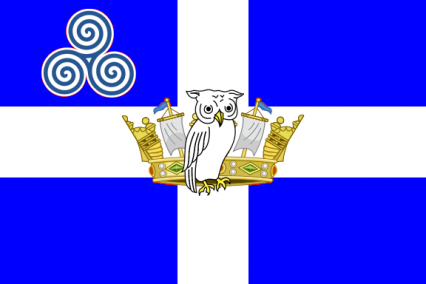1
1500-1815
Halling was an active participant in the colonisation of the new world. Halling colonized places such as Newfoundland, Quebec, Massachusetts, Hawaii, Several Pacific islands and some regions of the Brazilian east and north coast. By the time the first explorer from Halling, Humphrey Allan reached the coast of Newfoundland both Portugal and Norway were already trading with the natives, Allan died on the way back to Halling. Halling did not have the power to colonize in mass numbers as the Portuguese and the Spanish did however it did have a small military force that they could transport across and conquer a native settlement, calling it their own.
Humphrey Allan
So during 1501-1502 a force of 5,000 men lead by conquistador, Christopher Tudor eventually made it to Newfoundland after being transported 1,000 at a time. Halling conquered the native Miqmaq tribe and shortly after conquered the Abenaki tribe. Halling had a foot hold in North America, so she colonized the territories mentioned above with the exception of Brazil and Hawaii. Which started in 1593.

Christopher Tudor
Halling was fierce enemies with the Scottish in this time period and closest allies and friends of the English so Halling went to war with Scotland many times over twice on her own declaration and twice on England's declaration. All wars with Scotland were a resounding success for Halling and her allies. The first war Halling had with Scotland,she entered through England and Portugal was a participant. The first war Halling declared, Norway joined.
During the 1700s Halling had a large empire and army they fought against the French and her allies in the seven year war along with Great Britian. An army commanded by Maj. General, Robert Green assaulted the French ports and colonies along the gulf of Mexico, this campaign was a major success. With Naval support from Rear Admiral, Harper White in the coastal battles the Campaign of the Franco-Mexican colonies had barely any losses. In Europe however all battles that Halling was a big part of were Naval. Head Admiral, Gordon Thomas had his work cut out for him in the battle of the English Channel for the largest naval battle of the day. The loses were severe however that battle was the turning point of the war

Maj. General Robert Green

Rear Admiral Harper White

Head Admiral Gordon Thomas
The Napoleonic Wars were the bloodiest wars of this period for Halling and they were a huge part in them. Duke of Cork, Edmund Bristol was the general and Field Marshall of the Hallingish army. He fought beside the Duke of Wellington at Waterloo awaiting Prussian reinforcements. During this war Halling embraced some Scottish and Celtic traditions such as Bagpipes' and drums and in one regiment even kilts. The King, Philip II was very fond of marching songs and music so at nearly all the battles in these wars there was Hallingish fifes, drums and bagpipes being played. As in the seven years war there was a big Hallingish naval presence. Robert Dewitt, Head of the Navy at that time, was in the battle of Trafalgar on his ship, the RHS (Royal Hallingish Ship) Empire serving along side Horatio Nelson

Duke of Cork

Robert Dewitt

King Philip II











